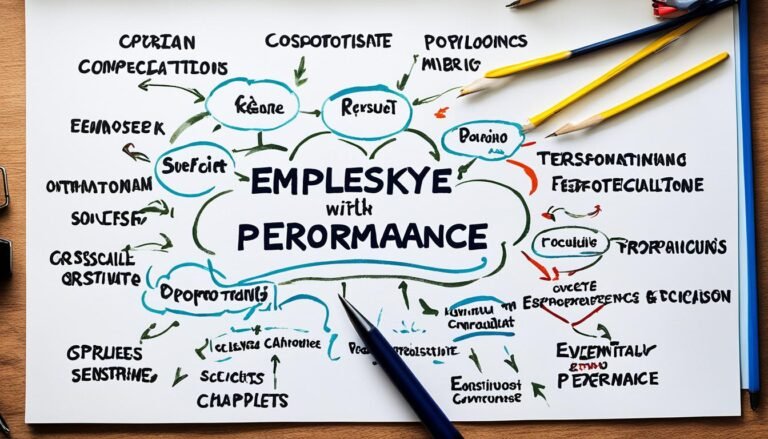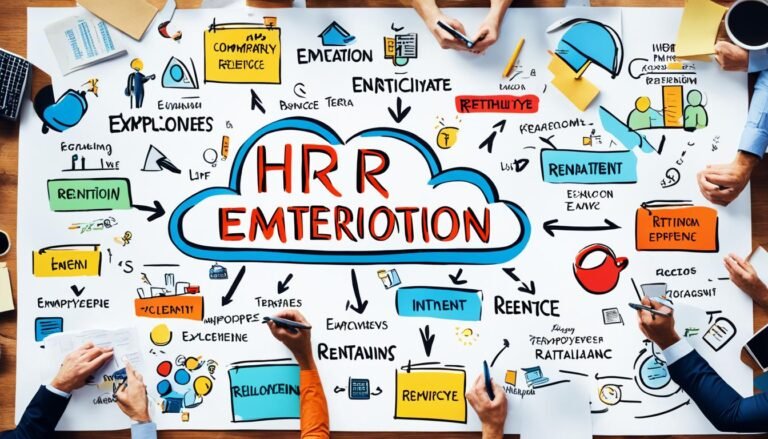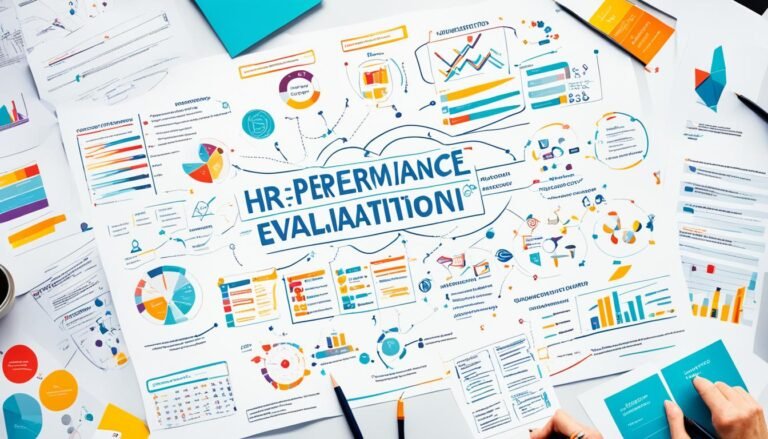A Guide to Human Resources Leadership
Human Resources leadership plays a pivotal role in organizations, driving the success of HR practices and aligning them with the overall goals of the company. HR leaders, whether they hold positions as HR Managers, HR Directors, or HR Executives, are instrumental in building strong relationships with employees and creating a positive work environment.
To be effective in their roles, HR leaders need a range of skills and competencies. These include strategic thinking, adaptability, strong communication skills, and the ability to foster collaboration within teams. By utilizing these skills, HR leaders can drive impactful change, improve employee engagement, and contribute to the growth and success of the organization.
Key Takeaways:
- Effective HR leadership is crucial for aligning HR practices with organizational goals.
- HR leaders need a diverse set of skills, including strategic thinking and strong communication.
- By fostering collaboration and improving employee engagement, HR leaders can drive impactful change.
- Strategic HR leadership involves understanding and responding to market shifts and utilizing data analysis to make informed decisions.
- To excel in HR leadership, professionals can pursue advanced HR credentials and actively seek leadership opportunities within the field.
What is HR Leadership?
HR leadership refers to professionals who hold leadership positions within an HR department. These leaders play a crucial role in building strong relationships with employees and aligning HR practices with organizational goals. Effective HR leadership starts with understanding the organization’s priorities, such as building brand equity and responding to market shifts, and then connecting those priorities to developing talent.
HR leaders can use various strategies to bring more value to organizations, including:
- Improving diversity, equity, and inclusion programs
- Connecting teams to the organization’s purpose
- Fostering collaboration
- Designing teams that align with organizational strategy
- Implementing Agile project management
- Utilizing data analysis to improve processes
By employing these strategies, HR leaders can contribute to the overall success of the organization.
HR Leadership Strategies
Strategic HR leadership involves aligning employees’ work with an organization’s business goals. HR leaders can utilize specific strategies to be more strategic in their approach.
- Improving DE&I Programs: Enhancing diversity, equity, and inclusion programs fosters a sense of safety and belonging within the organization, leading to a more engaged and productive workforce.
- Employee Experience: Connecting teams to the organization’s purpose by effectively communicating its mission and values helps create a meaningful employee experience, increasing motivation and loyalty.
- Team Collaboration: Fostering collaboration within teams through team-building activities and leveraging effective communication tools promotes innovative thinking and problem-solving, driving overall team performance.
- Organizational Strategy: Designing teams that align with the organization’s strategy by recruiting individuals with skills corresponding to a team’s specific tasks and objectives ensures a cohesive and high-performing workforce.
- Agile Project Management: Implementing Agile project management practices fosters a culture of collaboration, adaptability, and performance management, enabling teams to respond effectively to changing business needs.
- Data Analysis: Utilizing data analysis to improve organizational processes and plan for the future helps HR leaders make evidence-based decisions, optimize HR strategies, and enhance overall organizational performance.
By employing these HR leadership strategies, HR leaders can drive the success of their organizations, optimize employee productivity, and contribute to a positive employee experience.
| HR Leadership Strategies | Description |
|---|---|
| Improving DE&I Programs | Enhancing diversity, equity, and inclusion programs to create a sense of safety and belonging within the organization. |
| Employee Experience | Connecting teams to the organization’s purpose by effectively communicating its mission and values. |
| Team Collaboration | Fostering collaboration within teams through team-building activities and leveraging communication tools. |
| Organizational Strategy | Designing teams that align with the organization’s strategy to ensure a cohesive and high-performing workforce. |
| Agile Project Management | Implementing Agile project management practices to foster a culture of collaboration, adaptability, and performance management. |
| Data Analysis | Utilizing data analysis to improve organizational processes, inform decision-making, and enhance overall performance. |
HR Leadership Jobs
HR leadership roles offer a wide range of opportunities within organizations. These roles are essential for driving HR strategies, supporting the organization’s goals, and creating a positive work environment for employees. Some common HR leadership roles include:
- Chief People Officer: This leadership role focuses on planning HR programs, ensuring compliance with regulations, and overseeing employee onboarding and training.
- Human Resources Manager: Responsible for evaluating and improving recruiting and hiring processes, coordinating onboarding and training programs, and overseeing benefits administration.
- HR Business Partner: HR Business Partners collaborate with other leaders to maximize employee performance, assist with hiring and terminations, investigate employee complaints, and provide guidance on conflict resolution.
Each HR leadership role has distinct responsibilities and required qualifications. The table below provides an overview of the typical responsibilities, qualifications, and salary averages for these positions:
| HR Leadership Role | Job Responsibilities | Qualifications | Salary Averages |
|---|---|---|---|
| Chief People Officer | Planning HR programs, compliance oversight, employee onboarding and training coordination | Bachelor’s degree in HR or related field, extensive HR experience | $120,000 to $200,000+ |
| Human Resources Manager | Recruiting and hiring process evaluation, onboarding and training coordination, benefits administration | Bachelor’s degree in HR or related field, HR certification, experience in HR | $70,000 to $100,000+ |
| HR Business Partner | Maximizing employee performance, assisting with hiring and terminations, employee complaint investigation, conflict resolution guidance | Bachelor’s degree in HR or related field, HR certification, analytical and problem-solving skills, communication skills | $80,000 to $120,000+ |
These salary averages are subject to variation based on factors such as experience, location, and industry.
HR Leadership Skills
HR professionals need a range of skills to excel in HR leadership roles. These skills contribute to their success in driving organizational outcomes and creating a positive employee experience. Let’s explore some of the essential HR leadership skills:
Collaboration
Collaboration is a critical skill for HR leaders as they often work closely with cross-functional teams, employees, and senior management. By effectively collaborating with others, HR professionals can foster teamwork, promote open communication, and drive collective decision-making.
Communication Skills
Strong communication skills are vital for HR leaders to effectively convey information, ideas, and expectations. HR professionals with excellent communication skills can clearly articulate HR initiatives, policies, and changes, ensuring that everyone in the organization is well-informed.
Innovation
In today’s dynamic business environment, HR leaders need to be innovative and open to change. By embracing new ideas and technologies, HR professionals can drive innovation in HR practices, create better employee experiences, and support the organization in staying competitive.
HR Experience
Having a solid foundation of HR experience is crucial for HR leaders. HR professionals with extensive experience in various HR functions such as recruitment, talent development, and performance management can provide valuable insights and guidance to the organization.
Talent Acquisition
HR leaders play a vital role in talent acquisition, attracting and hiring top talent who align with the organization’s goals and culture. They possess the skills to identify and engage with candidates and make data-driven decisions to ensure successful recruitment outcomes.
Performance Management
Performance management is key to driving employee productivity and growth. HR leaders with expertise in performance management can develop effective performance evaluation systems, provide feedback and coaching to employees, and align performance with organizational objectives.
Emotional Intelligence
Emotional intelligence is critical for HR leaders as they deal with sensitive employee matters and navigate complex organizational dynamics. HR professionals with high emotional intelligence can empathize, understand, and address employee concerns effectively, fostering a positive work environment.
Employee Engagement
HR leaders focus on cultivating a culture of employee engagement and satisfaction. They employ strategies and initiatives to boost employee morale, create a sense of belonging, and enhance overall employee experience within the organization.
Developing and honing these essential HR leadership skills is crucial for HR professionals who aspire to thrive in HR leadership roles. Now that we have explored these skills, let’s move on to the steps HR professionals can take to develop their HR leadership capabilities.
HR Leadership Development: Steps to Take
HR professionals can take various steps to develop their HR leadership skills and advance in their careers. Building HR leadership skills involves identifying the skills needed for HR leadership roles, such as building technical skills like data-driven decision-making and organizational change management, as well as cultivating workplace skills like empathy, emotional intelligence, and conflict resolution. Obtaining advanced HR credentials, such as Senior Professional in Human Resources (SPHR) or Global Professional in Human Resources (GPHR) certifications, can enhance an application for a promotion or leadership position. Taking on complex projects, pursuing thought leadership opportunities, and actively seeking HR leadership roles can also contribute to HR leadership development and career advancement.
Building HR Leadership Skills
To develop HR leadership skills effectively, HR professionals need to focus on both technical and workplace skills. Technical skills such as data-driven decision-making and organizational change management are essential for making informed HR-related decisions and driving strategic change within the organization. Workplace skills like empathy, emotional intelligence, and conflict resolution are crucial for fostering positive relationships with employees and effectively managing conflicts and challenges.
Obtaining Advanced HR Credentials
Earning advanced HR credentials, such as SPHR or GPHR certifications, demonstrates a high level of expertise and commitment to the HR profession. These credentials can enhance an HR professional’s qualifications and make them more competitive in their pursuit of leadership positions. They also provide validation of their skills and knowledge in areas such as strategic HR management, workforce planning, and employee engagement.
Taking on Complex Projects
Participating in complex projects allows HR professionals to gain valuable experience and showcase their leadership abilities. By taking on challenging assignments, such as implementing a new performance management system or leading a company-wide diversity and inclusion initiative, HR professionals can demonstrate their capability to manage and drive complex projects to successful outcomes.
Pursuing Thought Leadership Opportunities
Thought leadership opportunities, such as speaking engagements, publishing articles, or participating in industry conferences, can help HR professionals establish themselves as subject matter experts in the field. By sharing their insights and experiences, they can contribute to the HR community and position themselves as go-to resources for HR leadership knowledge and best practices.
Actively Seeking HR Leadership Roles
Finally, actively seeking HR leadership roles is essential for career advancement. This includes networking with professionals in the field, staying updated on HR leadership job openings, and proactively applying for positions that align with one’s career goals. By demonstrating a proactive approach to career development, HR professionals can increase their chances of securing HR leadership roles and progressing in their careers.
Table: HR Leadership Development Steps
| Step | Description |
|---|---|
| 1 | Identify and develop technical skills, such as data-driven decision-making and organizational change management. |
| 2 | Cultivate workplace skills like empathy, emotional intelligence, and conflict resolution. |
| 3 | Obtain advanced HR credentials, such as SPHR or GPHR certifications. |
| 4 | Take on complex projects to gain valuable experience and showcase leadership abilities. |
| 5 | Pursue thought leadership opportunities, such as speaking engagements and publishing articles. |
| 6 | Actively seek HR leadership roles by networking and applying for suitable positions. |
Why Effective Leadership Skills are Essential in HR
Effective leadership skills are essential for HR professionals as they play multiple roles within organizations. HR leaders are not just experts in HR practices; they also serve as strategic partners and advisors to the business. Their ability to effectively utilize their leadership skills is crucial for driving the overall success of the organization.
As strategic partners, HR leaders collaborate closely with business leaders to shape HR practices and their outcomes. They provide valuable insights and expertise on various HR matters, offering guidance and support in areas such as employee consultation, recruitment and hiring, compensation and benefits, training and development, and culture stewardship.
By establishing themselves as trusted advisors, HR leaders contribute to the organization’s overall strategy and growth. They ensure that HR practices align with the business objectives and are designed to attract, develop, and retain the right talent. HR leaders also play a vital role in fostering a positive work environment and enhancing employee engagement.
“HR leaders are not just experts in HR practices; they also serve as strategic partners and advisors to the business.”
In their role as strategic partners, HR leaders need to possess a range of effective leadership skills. These skills include strong communication, collaboration, problem-solving, and decision-making abilities. HR leaders also need to be adept at building relationships and influencing key stakeholders within the organization.
By effectively utilizing their leadership skills, HR professionals can create a culture of trust, fairness, and transparency within the organization. They can promote employee engagement and foster a positive work environment that supports productivity and growth. Ultimately, effective HR leadership contributes to attracting and retaining top talent, driving business success, and ensuring the organization’s long-term sustainability.
“Effective HR leadership contributes to attracting and retaining top talent, driving business success, and ensuring the organization’s long-term sustainability.”
Leadership in HR is not just about managing HR practices; it is about strategically partnering with the business and becoming a trusted advisor. HR leaders who possess effective leadership skills can navigate the complex challenges of the modern workplace and deliver value to both employees and the organization as a whole.
Leadership Skills for a Human Resources Career
HR professionals require a combination of leadership skills to excel in their careers. These skills enable HR professionals to make informed decisions, build positive relationships, effectively manage tasks and projects, communicate clearly and confidently, and demonstrate empathy and emotional intelligence when dealing with employees and workplace challenges.
Essential Leadership Skills
- Decision-making Skills: HR professionals need to possess strong decision-making skills to navigate complex situations and make informed choices that align with organizational goals.
- Interpersonal Skills: Building positive relationships and effectively collaborating with colleagues are essential for HR professionals to establish trust and create a supportive work environment.
- Organizational Skills: HR professionals must be well-organized to manage multiple tasks, projects, and priorities within tight deadlines.
- Speaking Skills: Clear and effective communication is crucial for HR professionals to convey information, provide guidance, and facilitate interactions at all levels of the organization.
- Empathy: Demonstrating empathy allows HR professionals to understand and address the needs and concerns of employees, fostering a positive work environment.
- Emotional Intelligence: Having emotional intelligence helps HR professionals to recognize and manage their emotions and empathize with others, enabling them to handle conflicts and challenges effectively.
Developing and honing these leadership skills is crucial for HR professionals looking to succeed in their careers and contribute to the overall success of their organizations.
| Leadership Skills | Description |
|---|---|
| Decision-making Skills | HR professionals need to make informed decisions that align with organizational goals. |
| Interpersonal Skills | Building positive relationships and effectively collaborating with colleagues. |
| Organizational Skills | Managing multiple tasks, projects, and priorities within tight deadlines. |
| Speaking Skills | Clear and effective communication at all levels of the organization. |
| Empathy | Understanding and addressing the needs and concerns of employees. |
| Emotional Intelligence | Recognizing and managing emotions and empathizing with others. |
Conclusion
Developing effective HR leadership skills is crucial for HR professionals looking to succeed in their careers. HR leaders play a strategic role in aligning HR practices with organizational goals, fostering a positive employee experience, and driving the overall success of the organization. By implementing HR leadership strategies, cultivating essential leadership skills, pursuing professional development opportunities, and actively seeking HR leadership roles, HR professionals can enhance their leadership capabilities and make a significant impact in their organizations.







